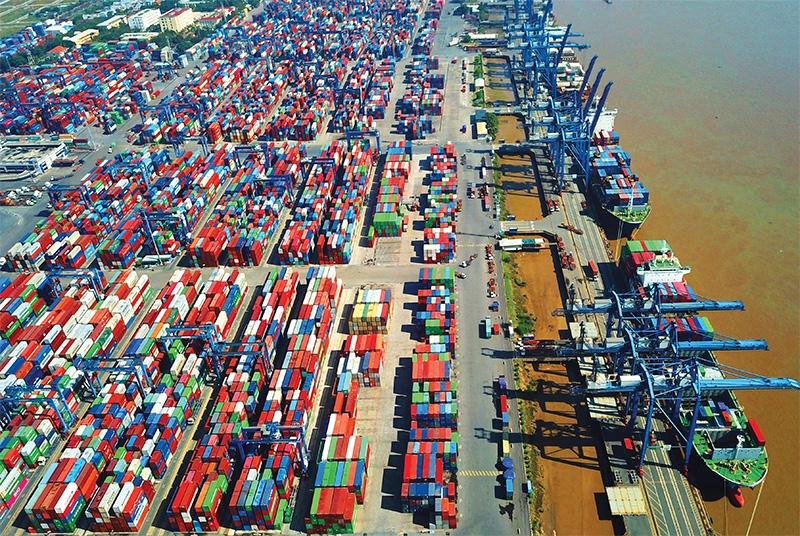Balanced recovery to battle unemployment
 |
| Despite the pandemic, Vietnam stays on a positive growth trajectory, photo Le Toan |
The International Monetary Fund (IMF) last week released its fresh forecast that Vietnam will be among only a few nations expected to see positive economic growth this year, at 1.6 per cent, before bouncing back to 6.7 per cent in 2021. GDP for 2020 will likely be over $340 billion, higher than Singapore’s expected $337 billion. Moreover, the IMF predicted that this year Vietnam’s per capita average income will increase from $3,415 last year to about $3,500 this year.
Vietnam is the only economy in the ASEAN-5 group (with Indonesia, Thailand, Malaysia, and the Philippines) that will maintain positive growth in the year in which the COVID-19 pandemic has been raging, exacerbating problems from the trade war between the United States and China.
However, Vietnam remains slow in creating new employment. Data from the General Statistics Office showed that in the third quarter of 2020, more than 1.2 million became unemployed, up over 148,000 people as compared to the same period last year, though the figure reduced by 63,000 against in the second quarter. The figures show that the domestic labour market is continuing to recover but at a slow pace.
According to Nguyen Hoai Nam from the Central Economic Commission, it is now necessary for the government to have a thorough assessment of its policies in supporting enterprises.
“Numerous difficulties remain for businesses, despite the government applying many new policies early this year,” Nam said. “For example, the policy on extending the time for corporate income tax payment is not significant because many enterprises have no revenues caused by the pandemic, so they cannot pay it.”
The government has set a target of 2.5-3 per cent in economic growth and in 2021, Nam said, if the pandemic still fails to be controlled globally it is likely that the economy will grow around 2 per cent thanks to development of the agricultural sector.
In the economy’s structure, agriculture counted significantly. In the first nine months of this year, the sector climbed 1.84 per cent on-year, almost equalling the economy’s nine-month 2.02 per cent economic growth. It is seen as a short-term fix, however, as the economy’s growth will still depend on many other sectors – especially processing and manufacturing, and services.
The Vietnamese economic outlook for 2021 is creating interest for scholars and policymakers. What is most important, said Nam, is that social and political stability must continue to be maintained in addition to macroeconomic stability and employment generation. “Creation of sufficient employment will help spur on economic growth and ensure social security,” he said.
According to experts, the key factors driving the Vietnamese economy are foreign direct investment, local private investment, and state funding. While the former will depend on foreign investors’ strategy, it will be difficult to increase investment from domestic private groups if there are no breakthroughs in institutional reforms and the state’s sturdy actions in favour of them.
Deputy Minister of Planning and Investment Tran Quoc Phuong stated that the economy is expected to grow over 2 per cent this year, with average per capita income estimated to be $2,750.
“In the 2021-2025 Socioeconomic Development Plan, GDP is expected to grow 6.5-7 per cent annually, the consumer price index will likely increase 4 per cent on average, and average per capita income is estimated to be $4,700-5,000,” Phuong said.
“To this end, it is necessary to continue macroeconomic stability, control of inflation, and ensuring balance in the economy. This must be done along with the proper use of fiscal and monetary tools to stimulate aggregate demand, and supporting enterprises and labourers – especially those suffering from income reductions and unemployment,” he added.
What the stars mean:
★ Poor ★ ★ Promising ★★★ Good ★★★★ Very good ★★★★★ Exceptional
 Tag:
Tag:
Related Contents
Latest News
More News
- NAB Innovation Centre underscores Vietnam’s appeal for tech investment (January 30, 2026 | 11:16)
- Vietnam moves towards market-based fuel management with E10 rollout (January 30, 2026 | 11:10)
- Vietnam startup funding enters a period of capital reset (January 30, 2026 | 11:06)
- Vietnam strengthens public debt management with World Bank and IMF (January 30, 2026 | 11:00)
- PM inspects APEC 2027 project progress in An Giang province (January 29, 2026 | 09:00)
- Vietnam among the world’s top 15 trading nations (January 28, 2026 | 17:12)
- Vietnam accelerates preparations for arbitration centre linked to new financial hub (January 28, 2026 | 17:09)
- Vietnam's IPO market on recovery trajectory (January 28, 2026 | 17:04)
- Digital economy takes centre stage in Vietnam’s new growth model (January 28, 2026 | 11:43)
- EU Council president to visit Vietnam amid partnership upgrade (January 28, 2026 | 11:00)




















 Mobile Version
Mobile Version